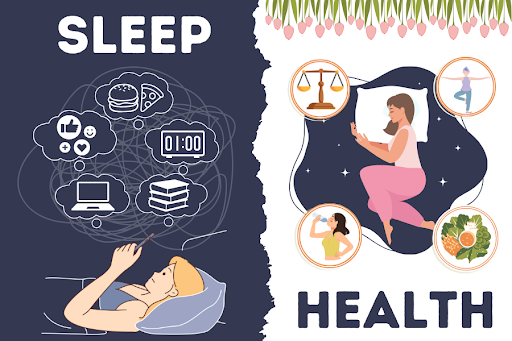College students face a lot of stress juggling school, work, family obligations, relationships and leisure. This pushes sleep to the bottom of the list of priorities, which can cause serious health problems.
Sleeping habits in college have a crucial effect on a student’s academic performance and overall health. Unfortunately, not many college students are conscious of their sleeping schedule, and their lack of quality sleep can cause sleep deprivation.
The recommended amount of sleep for adults (18 and older) is at least seven hours. College students, however, reportedly sleep 5.7 hours on average, sometimes even less. This deprivation affects their mood, academic performance, alertness and cognitive and behavioral improvement.
Junior psychology major Zachary Smith said he works overnight shifts on top of going to his classes which affects his academic performance since he feels tired and unable to focus on the material.
“I work through the night, and sometimes my body just doesn’t want to go more than three or four hours of sleep,” Smith said. “This affects my performance tremendously. I’m always yawning and usually by mid-day, I’m to the point where I want to go back to sleep,” he added.
Wellness coordinator Matthew Foster said he believes that high-stress levels have an impact both on the quantity and quality of sleep. This can be measured in the number of hours slept, how many times people wake up during the night and how rested they feel in the morning.
“High levels of stress can impact sleep by prolonging how long it takes to fall asleep and can fragment sleep. Stress triggers certain hormones like cortisol to be released which can further disrupt sleep and sleep cycles,” he explained.
Cortisol is a stress hormone produced by the HPA axis that balances blood sugar and blood pressure levels and regulates inflammation. The hormone is also responsible for the body’s fight-or-flight response. In constant stress, the HPA axis produces more of this hormone which results in alertness and disturbs sleep patterns.
Sleep and resting are essential functions since the body resets, restores and heals itself during this time. The benefits affect the hormone and immune system and can be measured in daily productivity, overall satisfaction and increased mood levels.
According to Foster, there are many ways people can improve their sleep habits. For example, spending time outdoors in the sun boosts Vitamin D levels, decreases stress and helps to sync the circadian rhythm.
“Utilize sleep resources. Using a sleep sound machine, sleep mask and taking a bath before bed can aid in getting good sleep as well as mindfulness, journaling and meditation,” Foster said.
Another tip is to establish a peaceful environment without technological distractions. Blue light, for example, from electronic devices causes alertness and increases heart rate since it limits the amount of released melatonin, a hormone responsible for drowsiness.
Physical activity also has a positive effect on sleep quality. It enhances the production of melatonin, reduces stress, regulates body temperature and improves mood.
Prioritizing sleep and establishing a nighttime routine is crucial for improving the cognitive, behavioral and physical abilities of college students and adults.
“A nighttime routine can look different for different people. Finding one that works for you and is easy to make a habit is the key. Sleep is a big part of health and your body will thank you for prioritizing it,” Foster said.








